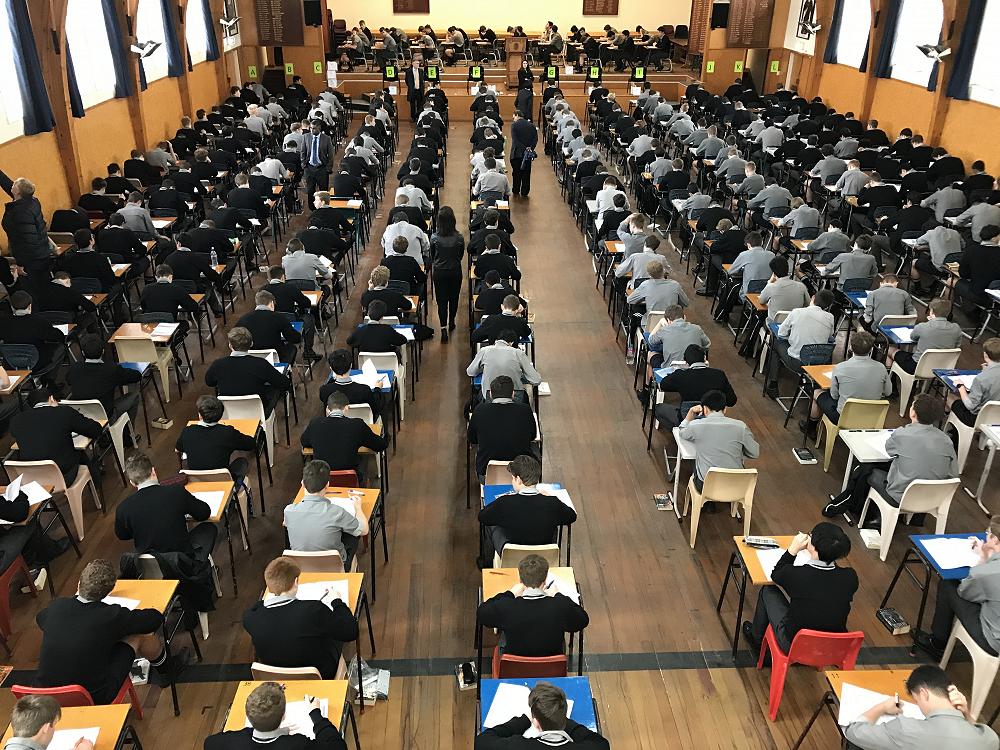
Year 10 Examination Information
Junior examinations take place from Monday, 2 November - Friday, 6 November. Below is information about examination topics in the core subjects to assist your son with his revision.
Year 10 Science:
Topics to be examined are Electricity, Genetics and Reproduction and Chemical Technology.
The exam will consist of some multiple-choice questions from the first half and second half of the year.
Topics to be examined
Section A: First Half- and Second half-year Multiple Choice
Section B Electricity
Section C Genetics
Section D Chemical Technology
Year 10 Mathematics
Students will be required to bring:
Calculator; Ruler; Pens
Students are advised to access past End of Year Examinations from Stratus.
Topics to be assessed:
Number: Percentage of a Quantity, Increase, Decrease, Inverse Percent, Ratios and Proportions, Fractions of a Quantity
Algebra: Simplifying, solving, rearranging and writing equations for a word problem.
Probability: Calculating Probability, Two-way Tables, Probability Trees, Calculating Expected Number.
Measurement: Measurement conversions, calculating Perimeter, Area and Volume (Formula will be provided on the cover page of the examination)
Angles: Calculating size of angles and giving geometric reasons
Right Angled Triangles: Pythagoras and Trigonometry
Graphs (Linear patterns, write equations for lines, draw lines from equations and application questions)
Year 10 English
There are three sections to the Exam:
Literary Essay - Film
● Students are expected to write on a film they have studied in class this year
● All questions begin with “Describe….and Explain…” (Y9 write at least two body paragraphs. Y10 write three body paragraphs.)
● Essays are marked on the ideas presented by student, depth and accuracy of supporting examples and their relevance to the question.
● Students should expect to spend around 55 minutes planning, writing and proofreading their essay
Unfamiliar Text - Non-Fiction
● 1 piece of unfamiliar text
● Students need to understand terms such as purpose, point of view, main idea, summarise, in your own words as well as a range of non-fiction language features that may be relevant to non-fiction text e.g. simile, metaphor, alliteration, imperative, listing, facts, statistics, rhetorical question, direct address, personal pronouns, abstract nouns, colloquial language, parallel structure, minor sentence, etc.
● Question types include multi-choice, identification of language features, and analysis of language and its effects.
● Students will spend 35-40 minutes on this section
Punctuation & Grammar
● Multi-choice
● Same format as mid-year test
● Students will spend 20-25 minutes on this section.
Year 10 Social Studies
The examination content-based questions will come from the following:
Global Issues
Describe causes and the nature of Child Labour, and its consequences
Understand the impacts of Climate Change on our future – especially sea level rises and climate change (Examining current and future examples.)
Treaty of Waitangi
Demonstrate understanding of the Treaty guarantees – the meaning of the Articles – including translation issues
Describe the changes in legislation allowing Maori to make claims through the Waitangi Tribunal and some examples of consequent claims and settlements
Describe some current issues relating to the Treaty of Waitangi
The examination format will be:
Short Answer section: (15 marks x 2) = 30 marks
There will be 15 marks awarded for short answer questions in each of the two topics – there will be similar types of short answer questions as in previous years.
Ten of these marks will involve short answer recall while five of these marks will require longer answers using a combination of memory recall and resource interpretation.
The 2018 November examination paper (and its marking schedule) is available on the Social Studies Stratus page
Essay: 20 Marks
Students complete one essay from a choice of two - there will be one essay for each of the two topics (Global Issues or Treaty of Waitangi))
There will be no stimulus material provided in the examination paper – student responses rely on memory preparation.
The essay will be worth 20 marks and will require extended and appropriate statements and explanations.
Students will need to demonstrate a depth of understanding of one of the questions listed below.
Essays will require two-part answers.
Skills: 20 Marks
Students will be required to:
Read information from graphs and tables of information
Recognize basic patterns and / or relationships and / or trends from graphs and tables of information
Make reasoned statements (infer) based on information provided.
This section is based on skills ability – not memory preparation. Skills practice is the way to prepare.
Current Events: 10 Marks
The examination will involve:
● Matching lists of headlines, events, places or people to a current event from June – October 2019
● Recognising people from a current event from June – October 2020
● Writing sentences to explain a current event from June – October 2020
